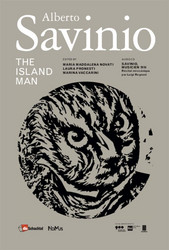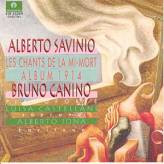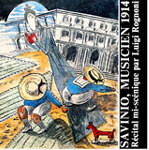Alberto Savinio
Italian polymath Alberto Savinio (1891-1952) left a large body of work in painting, music and literature which is highly regarded at home but little known in the English-speaking world, in spite of a few translations and exhibitions. After studying piano in Athens and composition with Max Reger in Berlin, Savinio seemed destined to a career in music. His early compositions seem to have made quite the impression in Paris avantgarde circles. Definitely one of the best exemple in futurism/early avantgarde music
I was surprised and beguiled; Savinio mistreated his instrument so much that after each piece the keyboard had to be cleared of chips and splinters. I foresee that within two years he will have gutted every piano in Paris. Savinio will then go on to destroy every piano in the universe, which may be a true liberation.
(Guillaume Apollinaire in Mercure de France, June 1, 1914)
I was surprised and beguiled; Savinio mistreated his instrument so much that after each piece the keyboard had to be cleared of chips and splinters. I foresee that within two years he will have gutted every piano in Paris. Savinio will then go on to destroy every piano in the universe, which may be a true liberation.
(Guillaume Apollinaire in Mercure de France, June 1, 1914)
Italian polymath Alberto Savinio (1891-1952) left a large body of work in painting, music and literature which is highly regarded at home but little known in the English-speaking world, in spite of a few translations and exhibitions. After studying piano in Athens and composition with Max Reger in Berlin, Savinio seemed destined to a career in music. His early compositions seem to have made quite the impression in Paris avantgarde circles. Definitely one of the best exemple in futurism/early avantgarde music
I was surprised and beguiled; Savinio mistreated his instrument so much that after each piece the keyboard had to be cleared of chips and splinters. I foresee that within two years he will have gutted every piano in Paris. Savinio will then go on to destroy every piano in the universe, which may be a true liberation.
(Guillaume Apollinaire in Mercure de France, June 1, 1914)
I was surprised and beguiled; Savinio mistreated his instrument so much that after each piece the keyboard had to be cleared of chips and splinters. I foresee that within two years he will have gutted every piano in Paris. Savinio will then go on to destroy every piano in the universe, which may be a true liberation.
(Guillaume Apollinaire in Mercure de France, June 1, 1914)


